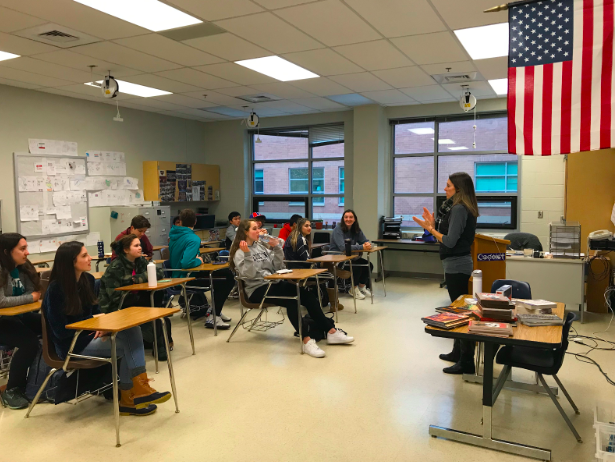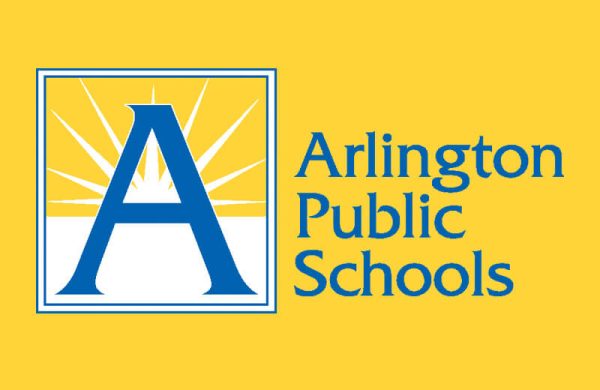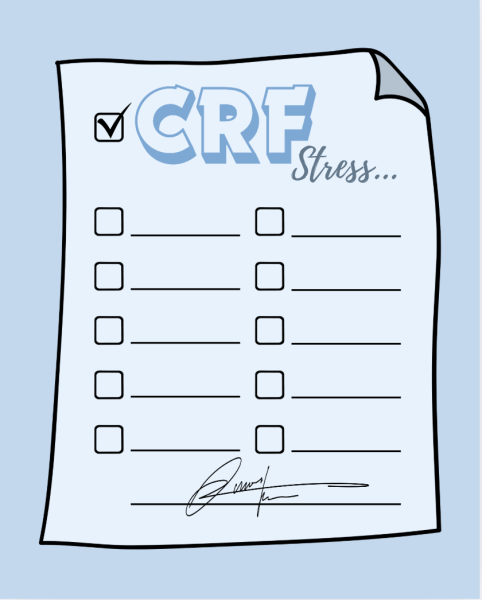A First Year For IB English SL
Ms. Larsen greeting her second period International Baccalaureate English Language and Literature class.
The 2018-19 school year is the first year that English 11 International Baccalaureate (IB) Standard Learning (SL) has become available at the school, and two English 11 Advanced Placement (AP) teachers have added a new class to their roster. Ms. Erica Larsen, who teaches both AP Language and Literature as well as IB Language and Literature, and Mrs. Katrina Reed, who has stopped teaching AP Language and Composition to focus on IB. AP and IB differ substantially in some areas, but are also very similar in others, so it makes sense for these veteran AP teachers to take on this new class.
The writing styles in AP and IB tend to cross over each other quite often. Both courses focus a considerable portion of their time on analyzing text and writing analysis papers, but in AP reading and writing is almost entirely based on non-fiction, whereas in IB students analyze a broader range of content.
“In AP there are three very specific essays that we’re working on [persuasive essay, synthesis essay, and rhetorical analysis]. In Language and Literature we are really working on analysis. There is a similarity with AP, but in IB we are doing that analysis with all different types of text,” Ms. Larsen said. “We’re analyzing music videos, visuals, text and speeches. We’re just doing a lot more of that analysis, so they overlap, but AP does more writing.”
The reading content in AP aligns with writing in the class, which means a lot of essays, biographies and memoirs. Similarly with IB, students read a combination of fiction and non-fiction, which conforms with writing subject matter.
“AP Language and Literature is a non-fiction class, so we read only non-fiction [speeches, journals, memoirs, etc.] IB Language and Literature has that title because it’s a combination of literature and nonfiction.” Ms. Larsen said. “The first quarter we’re doing non-fiction and media, advertisements, music videos, so on and so forth. In second quarter we’re analyzing poetry and novels.”
Some students prefer IB over AP English because IB leaves room for more innovation.
“My favorite part of IB English is how we discuss and analyze different media like advertisements, music, videos and tweets,” junior Olivia Jazwick said.
Grading scales and rubrics can be annoying and difficult to understand as students are trying to fit all the criteria for a high score. The same can even be said for teachers as well.
“They can be a bit more punitive than the IB ones [AP rubrics], the IB ones are focused on skills and content just like the AP ones are, but the AP rubrics can be very tricky, and it’s not necessarily an assessment of knowledge. It’s more of a ‘gotcha game,” Mrs. Reed said.
End-of-year testing for AP and IB English courses have proven to be somewhat dissimilar, and some favor one over the other. Both AP and IB are cumulatively assessed at the end of the school year (in May), but the actual testing scenarios diverge.
“I think the test can sometimes be a little overwhelming for students. I like that IB has a more holistic assessment, and they look at different benchmarks over the course of two years rather than riding on one exam.” Mrs. Reed said. “You get your IB score based on how you progress and how you learn and how you grow.”














Ann Felker • Mar 19, 2019 at 9:25 AM
Beautifully written, Hugo. Your first teacher, here. So proud of your accomplishments since you left my class . This is the best analysis of the IB – AP distinctions that I have seen in long time. Keep up the good work and the great smile. Some things never change.